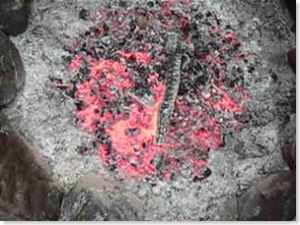Saturday, at the cabin, I listened to two Blue jays argue. They broke off only to fly to a new tree and a new perch where they took up the quarrel anew. Blue jays, or Western-scrub jays, which these could have been, are territorial and so I considered their argument exactly that. Eventually, on one tree, the argument resolved itself. A bilateral agreement was birdally enacted.
I share this little patch of ground with occupants I didn’t invite but were here long before I was. I take comfort in knowing they are welcomed here. I take comfort in the growing squirrel midden under the spruce and beside the old wooden-spoked wagon wheel. I take comfort and am warmed by the circle of fire built from the Black poplar that have changed form and now lie on the floor of the woods.
The smallest of arachnids as landed on my page. Smaller than print, the brown spider fits nicely inside a lower-case “o.” I lower my book and let her float to the ground.
 It’s hard to imagine from my chair by the embers that the world is bleeding over unresolved territorial quarrels. But then, perhaps not. I have blood on my own hands. How often have I peered through hooded eyes to reach out and grasp a centrepiece or a moment not meant for me?
It’s hard to imagine from my chair by the embers that the world is bleeding over unresolved territorial quarrels. But then, perhaps not. I have blood on my own hands. How often have I peered through hooded eyes to reach out and grasp a centrepiece or a moment not meant for me?
But somewhere there is liberty. Somewhere there is a fascinating freedom. But it is not within my self. It is in another. I am only and always set free by another. Someone outside of my rivalrous self. Someone moving beyond rivalry.
The Blue jays’ migration remains a mystery. One will stay far north and another will fly. Some will stay one year and leave the next. One will migrate on que–in season, and another will arrive. I like to imagine the jays’ migration mystery an elaborate system to keep themselves free of damaging ongoing territorial disputes.

Thomas–I stumbled upon Grow Mercy when I was doing a google search trying to find out whether many Girardians are vegetarian. (The search started with an attempt to find a book that uses Girard to advance a path forward out of our global ecological crises. I found a book called “Creation Unveiled”, but it seems to suggest that one must be vegan to live the non-violence of the Gospel. I was dubious about that so did some more searching and stumbled upon your web site.) The more I looked at your site the more fascinated I became. First, it was a treat to find someone on the Canadian plains who reads James Alison and Girard. I live in Regina and have only begun to study Girard and his interpreters, but the more I do the more I feel able to understand the heart of the Gospel. I am a naturalist and deeply concerned about what is happening to our northern Great Plains ecology. Species are thinning out at a ferocious pace. I’ve found Girard’s mimesis and scapegoat analysis greatly illuminating in understanding the path we have taken as a civilization in the Christian era. I teach Creative Writing (non-fiction) at St. Peter’s Abbey (Benedictine) in Saskatchewan, and I hope to become an oblate. I wonder if you are a friend of Myrna Kostash–she is an Edmonton writer and a Christian (Orthodox). Myrna helped me with my first book, RIver in a Dry Land. Anyway, I am rambling. I was thinking it would be good to develop an inter-faith group here in Regina that studies Girard and that one way to begin would be to have a guest speaker come and talk about Girard. Do you do that kind of thing? If not, do you know anyone in Alberta who does? I could set up a speaking engagement through the John Paul II centre or some other agency.
Please let me know.
P.S. If your cabin is in Canada, then it definitely was not a Scrub Jay. And your theory about their dispersal to avoid competition is sound. In fact it is one of the common ways ecologists explain bird migration. It is food shortage, not weather, that drives migration.
Trevor Herriot
Regina, Sk